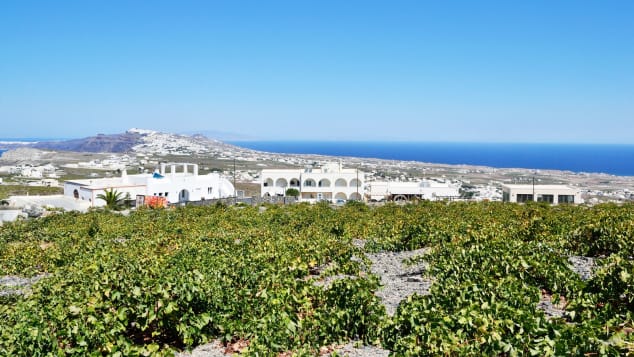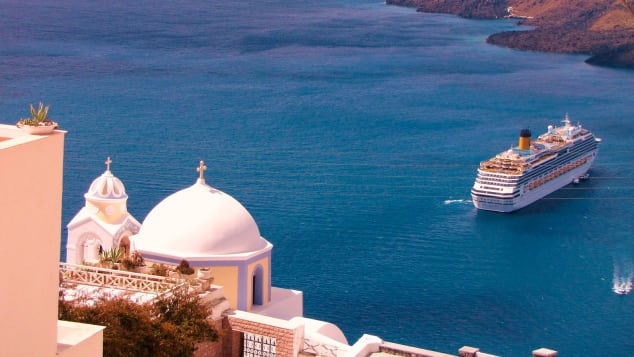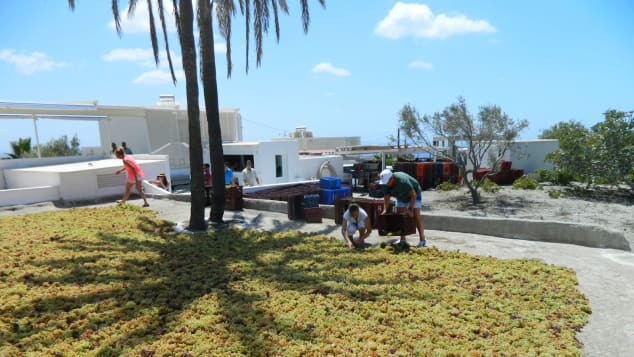Santorini's sweeping caldera, sunset cruises, picturesque blue-domed churches and whitewashed vacation cottages carved into a 300-meter cliff have made it an unstoppable success story among the islands of Greece.
However, the destination has become a victim of its own success, with Mayor Nikos Zorzos recently seeking to limit visitor numbers in a bid to battle mass tourism. As the island creaks under the strain, it may have found an unlikely savior: Wine.
Santorini has been trying to tackle its tourism problem for several seasons.
The number of cruise ship tourists stopping off in Santorini was drastically cut to 8,000 a day in 2017, a year after as many as 18,000 passengers were seen disembarking from the island's port in 24 hours.
Vanishing farmland

It's not just cruise visitors though. The ecology of the island has been threatened by a hotel building spree and water consumption has gone up by 46%, according to Zorzos.
"At least 11% of our island has been concreted over in recent years," he adds. "And our population has shot up to 25,000 because our very success has meant that everyone wants to work here."
According to Markos Kafouros, deputy mayor and president of Santo Wines, tourism here began at a sustainable pace, but proceeded to spiral out of control.
"It started in the mid 70s, in harmony with agricultural activity, but in the last 15 years the dramatic pace of hotel construction has made hotels a threat to farming on Santorini."
Against this backdrop, the island's fledgling wine industry could yet pull Santorini back from the brink by creating a viable second income source.
Wine tourism

"From the beginning of the '90s, vine cultivation and wine production entered a new era, when many modern wineries were built," explains Kafouros.
Put simply, wine cultivation -- encouraged by European Union incentives -- offered an alternative to plowing up fields to construct hotels.
"EU subsidies were used to promote wines from Santorini in the American market for seven years, from 2010 to 2017," he adds.
The exercise was successful.
These days the wines of Santorini sell out as fast as the island can produce them, mostly in Greece, but also in the United States and the rest of the world. As a result, the loss of farmland to hotel construction has virtually ground to a halt.
Nowadays 1,300 hectares of this 7,600 hectare island is given over to wine production. And while in 1995 the average age of a farmer in Santorini was 65, now it's 53.
Rising demand

This drop in age indicates that the younger generation is turning to wine production and therefore has a vested interest in preventing more hotels emerging.
Moreover, with a range of highly distinctive grapes -- Assyrtiko, Athiri and Aidini for white wine and Mavrotragano and Mandilaria for red -- Santorini's wine has also become an integral part of its tourism industry.
The success of the island's wine has helped alleviate concerns that Santorini was becoming too dependent on one source of income, just as it had been before a violent earthquake in 1956 that led to many residents leaving for the mainland.
The island's smaller vineyards sell their grapes direct to Santo Wines, a cooperative based on the island.
"We process 65% of the vines on the island and produce 840,000 bottles of wine a year," says Kafouros.
Santo Wines is also a perfect shore visit for cruise ship passengers as it's close to the harbor.
The shop here sells local produce, such as sweet tomato paste and fava, honey and olive oil from the mainland and cuddly donkeys (the traditional mode of transportation for centuries on Santorini.)
The average cruise ship tour group spends about 45 minutes at Santo Wines, during which people can taste wine at 50 cents a shot, buy bottles to take back on board and snap photos of the fabulous view from one of the highest points on the island.
But it's the island's Wine Route that is delighting many serious oenophiles.
Signposted with maroon road markers, it takes guests to the island's 10 independent wineries.
Michael Fytros, the manager at Venetsanos, a vineyard built into a cliff, says it relies heavily on visitors.
"We have the smallest production compared to other wineries," he says. "Last year we produced 27,000 bottles of which 5,000 went to the US.
"But 65% of our wine every year is sold to individual visitors. We average 40,000 visitors a year and we sell out every year."
At Argyros Estate, an old 35-hectare vineyard with a brand new visitor center, manager Stephanos Georgas runs up the national flag of his visitors if he knows a group of foreign tourists is arriving.
"We produce 280,000 bottles a year. I don't think we can produce much more. It's back-breaking work," he says.
As the grapes on Santorini are coiled into a basket shape at ground level to protect them from extremes of heat and cold, harvesting is always done by hand.
"The land here is called aspa," says Georgas referring to the volcanic ash, lava and pumice that litter the soil.
"This means no machinery can be used. Everything here is done by hand or donkey.
"The roots go down 20 meters in places to extract every nutrient from this volcanic landscape, but that's why our wine tastes so good."
In Megalachori, the southernmost part of the Wine Route, Dmitra Gavala, daughter of the current owner of Gavalas Winery, leads guests into an ancient whitewashed room where she once helped her father crush Assyrtiko grapes underfoot in the traditional manner.
Currently 70% of Gavalas's output goes to the United States.
The recent success of Santorini's wine has made it hard for vineyards to keep up with demand. But as the structure of the island means its impossible to mechanize, standards cannot slip.
This means the wine will remain as good as it is, a worthy second string to Santorini's economic bow.
Latest Stories
-
Wimbledon winner Purcell admits anti-doping breach
2 minutes -
Political party influence undermines leadership independence, says Prince Kofi Amoabeng
6 minutes -
CHASS advises against reopening schools on Jan. 3 until financial arrears are cleared
16 minutes -
Newmont’s Akyem Vocational Institute unveils battery-powered fufu machine at graduation ceremony
20 minutes -
Newmont reinforces cultural heritage commitment in host communities
28 minutes -
Oti Region records over 10 road accident deaths from January to September this year
33 minutes -
Ecobank Ghana inaugurates ‘Ecobank Retirees Association’: A legacy of fellowship and service
39 minutes -
Optimal OMD appoints Taniya Mondal as MD
53 minutes -
Lekzy DeComic hailed for masterful emceeing at OB Amponsah’s comedy show
54 minutes -
Premier Care Hospital sparks joy with second annual nine lessons and carols night!
54 minutes -
OB Amponsah fills 4,000 capacity Bukom Boxing Arena with comedy special
59 minutes -
Bridging digital and human intellect: Africa’s Path from 4IR to 5IR
1 hour -
How Newmont’s Learnership Programme empowered Dorcas Oppong to achieve her dreams
1 hour -
Kenya’s Ruto embraces rivals to shore up support
1 hour -
The student who blew whistle on Kenya airport controversy
1 hour

